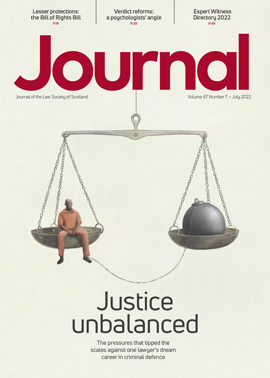Book reviews: July 2022
A Practical Guide to Extradition Law Post Brexit
Edited by Miles Grandison
PUBLISHER: LAW BRIEF PUBLISHING
ISBN 978-1913715359
PRICE: £34.99
 This book is written by a stellar cast of barristers who regularly appear before the English courts in extradition cases. They draw on their wide experience and have produced a valuable addition to the canon. This is the more so due to the implications highlighted by the UK withdrawal from the European arrest warrant (EAW) scheme consequent on UK withdrawal from the European Union.
This book is written by a stellar cast of barristers who regularly appear before the English courts in extradition cases. They draw on their wide experience and have produced a valuable addition to the canon. This is the more so due to the implications highlighted by the UK withdrawal from the European arrest warrant (EAW) scheme consequent on UK withdrawal from the European Union.
The founding principle of the EAW was mutual recognition. This meant in practice that a judicial decision of another member state would be given effect. There was mutual trust amongst the member states’ legal systems and their judiciary. Criminal orders would be executed parallel to the principle of free movement. Criminals move around, and warrants for their arrest in any EU member state would be given effect. It was often said that as the internal borders amongst the European states came down, the external border went up. The UK is now on the outside of that border and is regarded as a third state, albeit in the area of security and cooperation, one with a unique bilateral agreement with the EU.
The Trade and Cooperation Agreement (“TACA”) is an international treaty. As was said in Cretu v The Local Court of Suceava, Romania [2016] 1 WLR 3344, “the weaker canon of statutory construction [is] that Parliament does not intend to legislate contrary to the United Kingdom’s international obligations”. The Extradition Act 2003 was minimally amended following on the UK signing the TACA. The authors posit whether the route to incorporation of the TACA into UK domestic law gives the TACA primacy over domestic law. This is important given its effect on the mode and extent of interpretation of the TACA.
The authors also highlight the requirement in the TACA that the principle of proportionality is established, introducing a ground of refusal otherwise not as readily available. Of course, this works both ways and will be available to EU states as a ground of refusal. In addition, the significant introduction of the nationality bar as a ground of refusal by EU states is referenced. In short, as with all other non-EU states, 24 states have indicated either that they will absolutely refuse to extradite their own nationals or that they may surrender them on a conditional basis. It would have been interesting to see the authors’ views on the impact of the decision in Petruhhin [2017] QB 299. Practitioners will now need to be more nimble of thought and consider the parallel provisions available under the Council of Europe Conventions to address some of the lacunae.
The book is more than extradition between the UK and EU and provides a clear, considered and helpful analysis of extradition with non-EU states. Extradition law is reserved under the Scotland Act 1998. However, it is encouraging to see reference to some of the more significant Scottish cases in this area of law. This is a worthwhile and easily accessible book.
David J Dickson, solicitor advocate
Perspectives
Features
Briefings
- Civil court: Issues on appeal
- Licensing: Minimum pricing – a genuine impact?
- Insolvency: How to admit joint creditor claims
- Tax: windfall and plastic packaging taxes raise stakes
- Immigration: Asylum system overhauled
- Scottish Solicitors' Discipline Tribunal: July 2022
- In-house: In with the stonework
- Property: Living with the Register of Overseas Entities
In practice
- OPG update: July 2022
- Public policy highlights: July 2022
- Gear up for the Scottish Legal Walks
- Disabled solicitor support group proposed
- Risk: Cybercrime – the hybrid worker prey
- Ask Ash: Piling it on
- TRS: time for a trusts trawl
- Know people, know business
- High street and hybrid
- Appreciation: Ian Leslie Shaw Balfour
- The Expert Witness Directory 2022
- Expert witness: case law update






